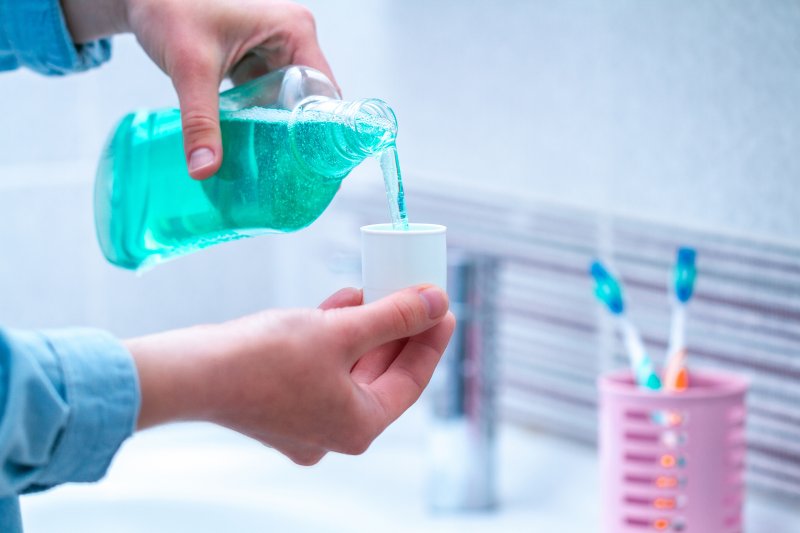Mouthwash is traditionally made with water and a number of ingredients meant to keep your breath fresh and mouth free of bad bacteria. While some suggest that it does not matter because the liquid is not meant to be consumed, many believe that mouthwash should be kosher certified as it is in contact with the mouth and could potentially be drank.
The truth is that mouthwash, like toothpaste, are considered kosher and chametz free by default as they are not considered at food. This is due to the fact that the ingredients are mostly inedible and unpalatable to the consumers.
However, the idea of mouthwashes being kosher have being heavily discussed in the Jewish community as some debate that the oral hygiene product should be labelled as a food as water is the main ingredient. Furthermore, many mouthwash contains glycerin, a natural ingredient that is usually derived from animal oil and gives a sweet, pleasant taste.
The claim that mouthwash is not considered as food was contended by renown Rabbi Yisroel Belsky who argued that mouthwash, lipstick and toothpaste should be certified kosher due to the large percentage of edible ingredients being used in the production of the products.
What is Kosher & Passover?
Kosher (Hebrew for “fit”) food refers to any food or beverages that confirms to the strict set of Jewish dietary laws of Kashrut. The laws dictate the types of food that Jews are allowed to consume as well as how the food must be prepared and processed. Some of the principles set by Kashrut include:
- Meat and dairy cannot be eaten together.
- Only domesticated fowl such as chicken or turkey can be consumed.
- Only seafood with fins and scales can be consumed. This means that crab, lobsters, oysters and other shellfish are not allowed.
- The animal must be slaughtered by a shochet, an individual who is trained and certified to butcher an animal in a kosher way.
- All traces of blood must be removed from an animal before it can be consumed.
- All bread and grains must be checked for kosher certification as it cannot contain non-kosher ingredients while the equipment cannot be used to process non-kosher products.
- All fruits and vegetables are considered kosher as long as it is check for insects, which is non-kosher.
- All wine can only be considered Kosher if it is handled by practising Jewish winemakers and adheres to Kashrut.
Every year, the Jewish people commemorates the exodus from Egypt during a week-long festival known as the Passover, or “Pesach” in Hebrew. During the period, the Jewish observe an additional set of dietary rules on top of Kashrut. The restriction forbids the consumption of chametz, which are grain-related food — wheat, barley, rye, oats and spelt — that has risen or fermented. The prohibition on the consumption of leavened bread is serves as a reminder of the day when the Jewish escaped Egypt and had no time for their bread to rise.
Best Kosher-Certified Mouthwash
Due to the strict rules imposed on Kosher-certified products, few companies have implemented the necessary practices to obtain Hechsher on their oral hygiene products.
Therabreath is one of few companies that have a Hechsher on its mouthwash. Some of its product include Therabreath Dentist Formulated Fresh Breath Oral Rinse (Mild Mint), Therabreath Plus Maximum Strength Fresh Breath Oral Rinse, and Therabreath for Kids Dentist Formulated Anti-Cavity Oral Rinse.
Another oral hygiene product manufacturer that produces Kosher-certified products is Tom’s of Maine. All of its product including the Sea Salt Natural Mouthwash and Wicked Fresh Mouthwash carries the OU (Orthodox Union) Kosher certification.
To conclude, mouthwash (and toothpaste) need not be Kosher certified as it is not meant to be consumed like a food. However, one should observe the stricter set of rules during Pesach and avoid the use of non-Kosher certified products during the festival. You are also advised to consult your rabbi to understand the standards set upon in the community.







